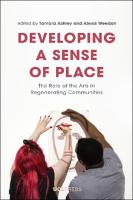Developing a Sense of Place
The Role of the Arts in Regenerating Communities
Contributor(s)
Ashley, Tamara (editor)
Weedon, Alexis (editor)
Language
EnglishAbstract
How do cultural planners and policymakers work through the arts to create communities? What do artists need to build a sense of place in their community? To discuss these issues, Developing a Sense of Place brings together new models and case studies, each drawn from a specific geographical or socio-cultural context. Selected for their lasting effect in their local community, the case studies explore new models for opening up the relationship between the university and its regional partners, explicitly connecting creative, critical and theoretical approaches to civic development. The volume has three sections: Case Studies of Place-Making; Models and Methods for Developing Place-Making Through the Arts; and Multidisciplinary Approaches to Place and Contested Identities. The sections cover regions in the UK such as Bedford, East Anglia, Edinburgh, Manchester, London, Plymouth and Wakefield, and internationally in countries such as Brazil, Turkey and Zimbabwe. Developing a Sense of Place offers a range of viewpoints from, for example, the arts strategist, the academic, the practice-researcher and the artist. Through its innovative models, from performing arts to architectural design, the volume will serve the needs and interests of arts and cultural policy managers, master planners and arts workers, as well as students of Human Geography, Cultural Planning, Business and the Creative Industries, and Arts Administration, at undergraduate and postgraduate level.
Keywords
arts; communities; urban planning; policy making; urban regeneration; higher education; cultural planning; arts strategy; architectural designDOI
10.14324/111.9781787357655ISBN
9781787357655, 9781787357761, 9781787357822, 9781787357884, 9781787358003, 9781787357655Publisher
UCL PressPublisher website
https://www.uclpress.co.uk/Publication date and place
London, 2020Imprint
UCL PressClassification
The Arts
Society and Social Sciences


 Download
Download